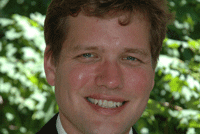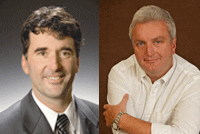
RUNNING. Conservative Party candidate Keith Fountain.
Three candidates:
Paul Dewar, NDP candidate
Interviewed by James Moran
Paul Dewar, a self-described “passionate, committed teacher and community activist,” is the son of former Ottawa mayor Marion Dewar. Dewar is part of many community organizations, including Coalition For A healthy Ottawa, the First United Church and the Ottawa And District Labour Council. Ed Broadbent now holds the Ottawa Centre seat, but is stepping down to spend more time with his wife.
Keith Fountain, Conservative Party candidate
Interviewed by Neil McKinnon
Keith Fountain, 40, lives on Waverly St with his wife and daughter. He has lived in Ottawa Centre his entire life. Fountain earned a degree in political science from McGill University, and joined the foreign service in 1990. In 2003, he helped open Canada’s embassy in Kabul, Afghanistan. He has also worked on trade policy and relations with India and was assigned to the Privy Council Office for two years (2001-03).
Richard Mahoney, Liberal Party candidate
Interviewed by Mike Cottingham
Richard Mahoney has been a special assistant to senior Liberal cabinet ministers. He is counsel to the law firm Fraser Milner Casgrain LLP, where he has practiced public and regulatory law advocacy. He’s a professional lobbyist. Mahoney was the Liberal candidate for Ottawa Centre in the 2004 election, placing second behind Ed Broadbent. He is married to a woman and has three children. Mahoney says he wants to strengthen healthcare, support educational opportunities, help the technology sector and hold down the costs of owning or renting a home.
And where they stand on the issues:
1. What would you do to eliminate the provisions in the Criminal Code that allow someone who kills a gay person to get a lighter sentence by claiming a “homosexual panic” defence?
DEWAR (NDP): I think what we need to do is amend the criminal code to make sure that that loophole is closed. That’s not something that should be allowed. That’s the first thing. As importantly, we need to make sure that the criminal justice system is aware of this issue. Judges need to be educated on the issue and advocates (ie lawyers). I think that there’s a wealth of knowledge within the community that can be very pro-active and progressive to help educate lawyers and judges.
FOUNTAIN (CONSERVATIVE): I’m very concerned about violent crimes, and we really need to do more to curb it. What matters is the crime. I don’t think that the motivation is necessarily important. It’s the act itself. If somebody tries to get off because they say they were motivated by a homophobic rage, well, you know, in the end you committed a crime.
MAHONEY (LIBERAL): I would want to look at that defence and I would want to take whatever steps I can to limit or eliminate that defence being available, either via changing the sentencing guidelines or whatever other legislative means would be necessary.
2. What would you do to ensure that Sections 210 & 211, the bawdyhouse provisions, of the Criminal Code are changed to stop patrons and owners of bathhouses from being targetted as criminals for engaging in consensual sex between adults?
DEWAR (NDP): A two faceted-approache: make sure that the code isn’t used to target bawdyhouses or establishments where there is a consensual activity going on, and make sure that the security of a person is not compromised. Then, of course, educate at the local level with the police services.
FOUNTAIN (CONSERVATIVE): (Fountain e-mailed his response after reading the party’s policy book.) My position is that all private adult consensual sex that does no harm to the public should be decriminalized. If there is a commercial relationship involved, however, then there should be regulation of this industry to protect both workers and customers.
MAHONEY (LIBERAL): Well, I’d like to review both 210 and 211 and see whether there is any necessary public policy purpose in those in the world we live in right now. That doesn’t make sense to me. This is an anachronism – these bathhouse raids, [charging] consenting adults. The state has no place in the bedrooms of the nation.
3. How will you defend the right of teenaged gays to choose their sex partners, a right that has been reduced by Bill C-2? Will you reduce the age of consent for anal sex to 14, as it is for other forms of sex practiced by heterosexuals?
DEWAR (NDP): I would make sure that whatever law, in terms of age of consent, is not going to discriminate on the basis of sexual orientation. There was a debate about age of consent very recently in the House and there were some fairly strong arguments put forward to talk about changing the age of consent to 16. In the party, we said if this is going to happen, we don’t want to have people who are criminalizing sexual activity. It’s absurd.
FOUNTAIN (CONSERVATIVE): In the case of people who are 14 years old, sex is sex. The important thing is there is consent. And if the minimum age (of consent) is 14, which it is, that should be applied to everything. I don’t think we need to make artificial distinctions between what they do.
MAHONEY (LIBERAL): On first blush, I can’t understand why there would be any distinction, so I’d have to educate myself, but presumably, assuming when I did educate myself, I could see no reason for distinctions, I would support any attempts to amend it. And I wonder if [the gay community was consulted] when the bill was passed. Did the community come before the legislative committee and say, “What is going on here?”
4. Would you amend the federal Human Rights Act to prevent discrimination against trans people?
DEWAR (NDP): Absolutely. I’ve been very vocal about that in terms of saying that I would support it. I see it as the next obvious step in terms of progression within our community of recognizing diversity and supporting diversity. Note that I didn’t say “tolerating” because I don’t want to be tolerated; I want to be accepted. That’s really what the law’s about.
FOUNTAIN (CONSERVATIVE): I think that existing provisions in terms of protection of gays, lesbians, bisexuals are sufficient enough to also apply to transgender people. I think that also existing human rights legislation about gender is also sufficient. If it turns out that these are not sufficient, then I would certainly work so they are changed so they are. But right now, I think there hasn’t been a lot of testing of this, and I think on the face of it it looks like what we have now.
MAHONEY (LIBERAL): I do support that amendment. I said that publicly in the last campaign, and again, I would support an amendment to the Human Rights Act to prohibit discrimination against transgendered people.
5. Would you ensure that federal infrastructure money is given to Ottawa to ensure a queer community centre is built in this city?
DEWAR (NDP): I would be a strong advocate for that money to be invested, as I call it, not spent, in a Pride or queer centre and to help with that as the MP. It’s a community asset to have that service. We need to have more access for particularly our young people. In the ’90s there was a lot of good outreaching and education and public health education going on. We need to rejuvenate that energy with our youth.
FOUNTAIN (CONSERVATIVE): I think the federal government shouldn’t be involved in projects that are purely local in nature. I think that’s something that has to be a community initiative and has to happen at the community level.
MAHONEY (LIBERAL): I will do whatever I can to help, including looking for and being an advocate for federal funds for a community centre. As to what the source of funds is, whether it is an infrastructure program or something else, I’m neutral. It doesn’t matter to me where we get it from.
6. How could the federal government offer better financial support to queer festivals, like the Ottawa Pride festival or queer theatre and film festivals?
DEWAR (NDP): I think the federal government needs to play a more active role in our community arts funding, generally speaking. The federal government’s responsibility and role is to support communities. The city agenda can be understood by not only investing in roads and hospitals but also investing in the arts – specifically, in things that are important to our community, and clearly the Pride festival and film festivals are the way to do that. It makes economic sense.
FOUNTAIN (CONSERVATIVE): I don’t think the federal government should be in the business of offering financial support to local festivals at all. I think that people in their own communities fund their own initiatives. That way they don’t have to go begging to the federal government for cash. And it’s cheaper for them in the long run because they’ll be able to pay for it with reduced taxes that we’re no longer taxing people to pay for these kinds of festivals.
MAHONEY (LIBERAL): I would like to see the federal government participate through the Arts Presentation program; they have such a program, but it clearly is so far inadequate. That’s what the festivals are telling us. There’s not enough money there. And that’s something I’ve already started to work on.
7. Would you support establishing a national office to standardize and collect hate crime statistics from across Canada.
DEWAR (NDP): Yes. Not only I would I support it, I would use Ottawa as an example of how to do it. I’m talking about the Ottawa police services. When you’re dealing with hate crimes, biased crimes, if you do not have the data, then how are you going to be able to put the resources in the right area? I think it’s an excellent idea. So you need to fund it.
FOUNTAIN (CONSERVATIVE): I think more information is always better, and if these statistics aren’t being collected and centralized now, then they probably should be.
MAHONEY (LIBERAL): Yes. That seems like a very reasonable idea and, actually, a very good idea. I think that the next big challenge that we should take on is what I would call completing the work on discrimination and hate. Progress has been made, but I’d like to take advantage of the momentum we have coming out of the campaign for equal marriage to deal with those issues.
8. How would you ensure that the next phases of the LeBreton Flats development will provide truly affordable housing for people on the social housing waiting list, people in the lowest 20 percent of income?
DEWAR (NDP): I see housing as a right. What I want to happen for LeBreton Flats is that we would come together as a community to decide what we wanted to look like and present that to the NCC and have that plan generated by the community. It would be an inversion of what has happened with Phase One of the LeBreton Flats. I’ve worked with this kind of community development model before. What I would like to see is a large component of LeBreton Flats as affordable housing.
FOUNTAIN (CONSERVATIVE): There’s two ways to get developers to build low-cost housing. You can try and force them to do it, in which case they’ll find every way they can to delay and get around it. Or you can provide with them with incentives to do so with tax breaks and that way they’ll enthusiastically charge for it and build affordable, quality housing, sufficient for the needs of local people. That’s what I would support.
MAHONEY (LIBERAL): The first is, I think we need new leadership in the NCC. We need to open up the NCC to the community. It does great work but it makes its decisions behind closed doors and decisions made behind closed doors, when they involve issues like LeBreton Flats, are often going to be bad decisions. And in stage two, I want non-profit housing. The way to ensure that there is truly affordable housing there from the beginning is to make sure that a non-profit is part of it.
9. If your party decided to enact a law that discriminated against queers, like revoking the right to marriage, will you commit to resign from caucus and speak out against the proposal in the loudest possible way?
DEWAR (NDP): It’s a simple answer – yes! Yes, I would, because there have to be principles in politics and this is definitely a principle that I would adhere to – supporting equal marriage in this case.
FOUNTAIN (CONSERVATIVE): First of all, I don’t think the party will bring that back. Parliament has had its say on this issue, and it’s really time to move on. And I really welcome that because it’s an important step forward to bringing the gay community into the mainstream. If the subject came up again, I’d vote against it. I’d work to convince my colleagues and all the parties to maintain the current status quo, in which gay marriage is legal. But I wouldn’t drop out of caucus because that would defeat the purpose of what I’m trying to do.
MAHONEY (LIBERAL): Yes, but that’s not going to happen. I’m not expecting the government and the party that passed that historic achievement – equal marriage – which I’m very proud of and will be campaigning on in the election, to be doing anything but promoting those values.


 Why you can trust Xtra
Why you can trust Xtra


